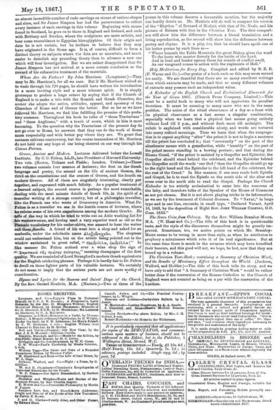A Kalendar of the English Church and Ecclesiastical Almanack for
the Year of Grace 1867. (Church Press Company, Limited.)—This
must be a useful book to many who will not appreciate its peculiar doctrines. It must be amusing to many more who aro in the same position. The union of the ritual observance of a day as a feast with its physical observance as a fast seems a singular combination, especially when we learn that a physical fast means going entirely without food till 3 p.m., and without flesh meat till midnight. The
rubric is explained with considerable nicety, and words are tortured
into many refined meanings. Thus we learn that when the congrega- tion is to repeat anything " after " the priest it is not to begin a sentence till the priest has concluded it ; that " reverently " on the part of the
almaboarer moans with a genuflection, while " humbly " on the part of the priest moans standing in a bowing posture ; and that during the
Nicene Creed, "if the priest is assisted by a Gospeller and Epistoler, the Gospeller should stand behind the celebrant, and the Epistoler behind the Gospeller until the words 'one God ;' then the Gospeller should go up to the right hand and the Epistoler to the left hand of the celebrant, for
the rest of the Creed." In like manner, if one man reads both Epistle and Gospel, he is to read the Epistle on the south aide of the altar and cross over to the north side to read the Gospel. Perhaps the Church Kalendar is too strictly ecclesiastical to enter into the concerns of the laity, and therefore talks of the Speaker of the House of Commons
as not yet chosen. But it is not above playing tricks in its information, as we see by the treatment of Colonial dioceses. To " NATAL," in largo typo and in one line, succeeds, in small type, " Declared Vacant, April 16, 1863, by the deposition of Right Rev. JOHN WitiaAat Comm°, D.D. Cons. 1853."






























 Previous page
Previous page